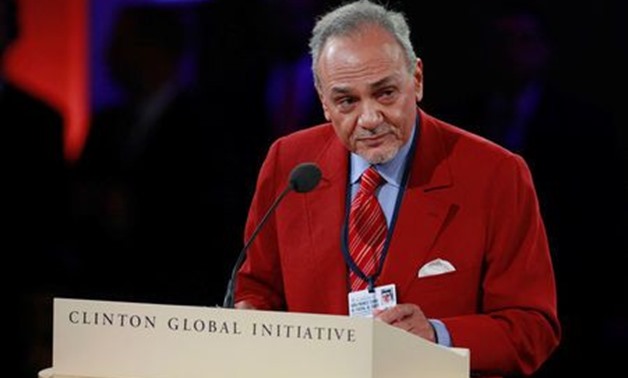
Prince Turki al-Faisal al-Saud of Saudi Arabia, speaks at the closing forum of the Clinton Global Initiative 2012 (CGI) during the final day of the event in New York, September 25, 2012. REUTERS/Andrew Burton
RIYADH - 20 December 2017: U.S. President Donald Trump’s recognition of Jerusalem as Israel’s capital will stoke violence in the region, former Saudi intelligence chief Prince Turki al-Faisal said, dismissing reports of prior consultations made with Riyadh over the move.
“It is a very bad decision. The consequences will be more bloodshed, more conflict rather than peaceful resolution,” Prince Turki, a senior royal family member and a former ambassador to Washington, told Reuters in an interview on Tuesday in Riyadh.
Trump reversed decades of U.S. policy and veered from international consensus this month by recognizing Jerusalem as the capital of Israel. Most countries say the city’s status must be left to negotiations between Israel and the Palestinians.
Saudi Arabia condemned the decision. Saudi King Salman told President Trump that any decision to move the U.S. Embassy in Israel to Jerusalem before a permanent peace settlement is reached will inflame the feelings of Muslims, official media reported.
But Saudi Arabia stopped short of calling for any Arab action against the decision. Palestinian officials say Riyadh has been working for weeks behind the scenes to press them to support a nascent U.S. peace plan.
“The reaction here was total surprise,” said Prince Turki, who now holds no government office but remains influential.
“... If there has been prior consultation or anything like that, why would the King go through the process of telling him (Trump) this is a bad idea and make that known publicly?”
“I don’t think there ever was any discussion of this” before the decision was taken, he added.
ARAB PEACE INITIATIVE
As regards possible Saudi and Arab action in response to Trump’s decision, Prince Turki said: “I am sure lots of people would prefer to have something just for the sake of appearance but I don’t think that’s how the Saudi government operates. If it is going to take action, it is going to be a serious action.”
Four Palestinian officials, who spoke on condition they not be named, said Saudi Crown Prince Mohammed bin Salman and Palestinian President Mahmoud Abbas have discussed in detail a grand bargain that Trump and Jared Kushner, the president’s son-in-law and adviser, are expected to unveil in the first half of 2018. Arab officials say the plan is still in its early phases of development.
Prince Turki said he was unaware of details of any such plan.
Prince Turki is a son of King Faisal, who was assassinated in 1975. His brother, Saud al-Faisal, served as foreign minister for 40 years until 2015, and their branch of the family is seen as influential over Saudi foreign policy, even as Crown Prince Mohammed bin Salman has solidified his authority.
Prince Saud championed a 2002 Arab peace initiative which called for normalizing relations between Arab countries and Israel in return for Israel’s withdrawal from lands occupied in the 1967 Middle East war.
In a letter to Trump published in a Saudi newspaper on Dec. 11, Prince Turki said that Trump’s “opportunistic” Jerusalem move would threaten security in the region.
KINGDOM QUELLS PROMOTERS OF MILITANCY
“The now much diminished terrorist international gets a rejuvenation boost from you and re-energizes its recruitment of volunteers to broaden their murderous attacks on innocent civilians, worldwide,” he wrote in his letter.
Saudi Crown Prince Mohammed bin Salman has said he would encourage a more moderate and tolerant version of Islam in the ultra-conservative kingdom.
The ambitious young prince has already taken some steps to loosen Saudi Arabia’s ultra-strict social restrictions, scaling back the role of religious morality police, permitting public concerts and announcing plans to allow women to drive next year.
Prince Turki said that Saudis share in the blame for the spread of extremist ideology through funding of mosques abroad that may have fallen into the wrong hands, but that such funding stopped since the Sept. 11, 2001 attacks in the United States.
“The kingdom has been the victim of such people and such activity... Since Sept. 11 the kingdom has had a sustained and continuous program opposing extremist ideology, not just in the kingdom but abroad,” he told Reuters.
“For a period of time, yes it is true there were some Saudis who promoted issues of extremism and so on. Now we are getting rid of all of those. I would say we have gotten rid of most of them, if not all of them.”


Comments
Leave a Comment